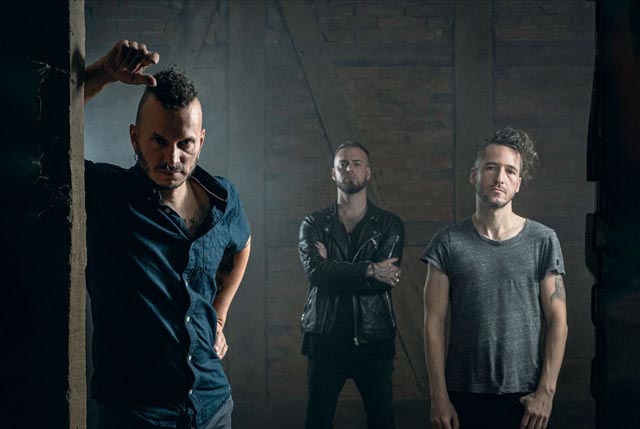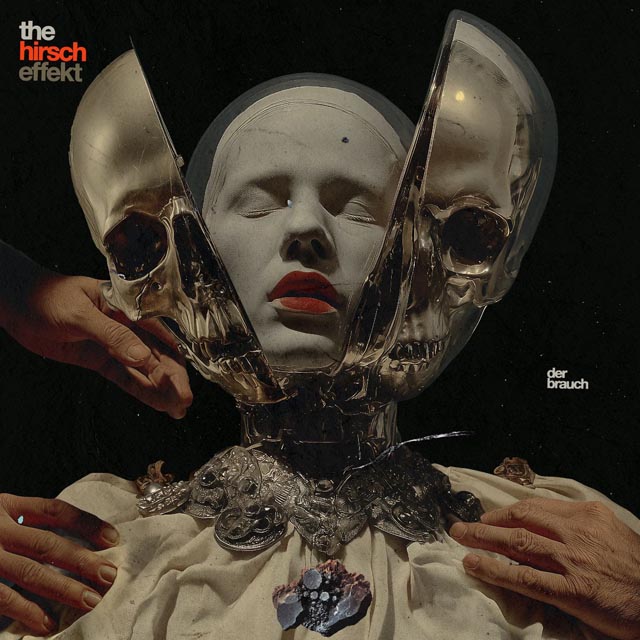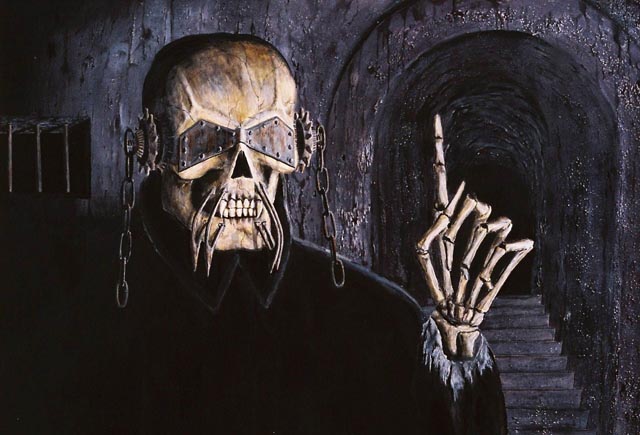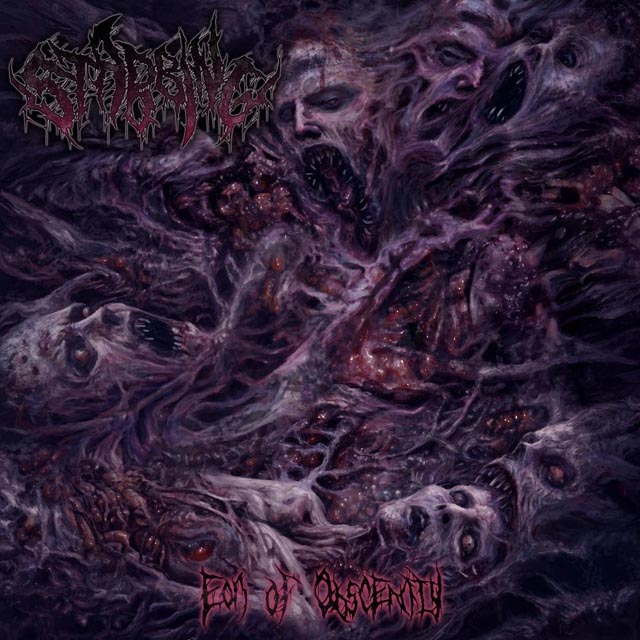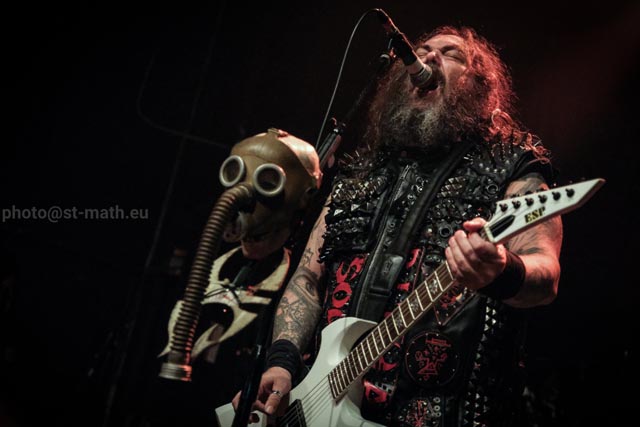
If you were a metal fan back in 1996, you may have been thrown for a loop upon hearing Sepultura’s Roots album. Roots was not the classic thrash of past glories like Arise and Beneath the Remains, or even the more groove-oriented fare the band was moving towards on Chaos AD. This was a new animal, the perfect album for a metal scene now standing atop vital sounds like Fear Factory’s Demanufacture, Korn’s self-titled debut, and Down’s NOLA. There’s no denying it was a period where the “new breed” was emerging.
Roots was laced with indigenous tribal chants, DJ scratches, and world-music-influenced tones, from djembe and timbau, to berimbau and sitar. Along with the pristine production equipment. As if the album’s unmistakably Brazilian-themed artwork and photos of the band hanging with the Xavante tribe in full facepaint weren’t enough to turn a few heads, the guitar tones would surely do the trick. Notable for its use of de-tuned guitars at the time, Roots helped to pave the way for what we now take for granted by both traditional metal and metalcore bands as diverse as Deftones, August Burns Red, Parkway Drive, and Slipknot. The album would prove to be a turning point for the musical boundaries vocalist/guitarist Max Cavalera went on to shatter in his next band, Soulfly, and continue to be a blueprint for Cavalera’s journey today.
Max Cavalera, along with drummer brother Iggor, are currently in the midst of a tour commemorating the 20th anniversary of Sepultura’s Roots album. Broth
I have to ask you, Max, how your brother Iggor is doing. I know you had to postpone the first couple dates of this tour due to him injuring his foot.
He’s doing good – he’s here today. He’s got a cast on, but he’s going to play through it. He’s a soldier; he’s a warrior (laughs). I was telling him how I was watching an old Motorhead video with Phil Taylor, how Phil played with a cast on when he broke his arm. Iggor’s a trooper, just like Animal. He’s in good spirits, and everybody’s excited for this this tour.
You’re celebrating 20 years since Roots, and I’m curious – with such a landmark album, did you know exactly what you wanted going into the project, or did it take shape as you were going along?
We always had this search for something new and exciting; it was always part of who we were. I was messing around with ideas for Roots, and I was writing on my own a little more, because everyone was taking some time off. I didn’t like to take time off, I like to stay busy. I got a four-track, and I started writing riffs – I actually wrote a lot of the riffs for Chaos AD that way – “Refuse/Resist” and “Territory.” Then, I went into the same system with Roots – there’s a demo floating around on the internet for “Roots.” That’s the original four-track demo that I did.
So, when the guys got back from vacation and we started rehearsing, I had a couple songs complete like “Roots” that I showed them, and they really liked it. We just went right into turning them into songs. There were songs that came out of total jams, like “Straight Hate” – it was really noisy, chaotic, with lots of dissonance. There was almost a punk influence on that one – a little Fugazi, Black Flag influence, but it was fun. I didn’t know we were making such a big record but I had a feeling that the record was going to be something special, especially when the songs started coming to life and we started tracking. Songs like “Roots,” “Ambush,” you got the feeling to it.
Then, with the idea to go to the tribe, it gave the album color – it was really the centerpiece of the album. We went in and spent three days with the Xavantes and they painted us – we used a lot of those pictures during the whole “Roots” campaign, so altogether, it was a really exciting record to make.
I remember, as a college kid in Pennsylvania at the time buying that record, just thinking how I’d never heard anything like it before – especially from a rhythmic standpoint. Were you worried about how it would be received, as it was a bit of a departure from the straight-up thrash you guys had been doing?
I think Roots was a very intense record, although it wasn’t like Arise. We simplified the riffs a bit – they’re less intricate and straightforward. Especially if you look at a song like “Roots” – it’s essentially the same note over and over, just very intense. I think what we were trying to do was have the same impact, but in a different way. One thing we didn’t want to do is start repeating ourselves. We could have done Arise, Pt.2 or Arise, Pt. 3 and I think the fans would have liked that. But, as musicians, I don’t’ think it would have been good for us. For me, Roots opened the door to so many possibilities – it said that you can do the impossible; the impossible is now possible. It was a life-changing record for me, and I’m still following the path we made with Roots in many of the other projects I do. The thing with the fans is this: I remember when we made Morbid Visions, and we were considered sellouts because we no longer just had demos. You can’t pay attention to that – you’ve got to follow your heart. There’s always going to be people that don’t like what you’re doing, and we got plenty of negative criticism on Roots. For me, it was the right record to make at the time, and it proved to influence a lot of people in the metal world.
I can’t think of a better example, in terms of influence, than the Roots record for that de-tuned, bottom-heavy guitar tone. You guys were really leaders as far as that goes. Of course, now you can’t get away from it.
Yeah, I had to fight with Andreas over that, because Andreas was such a purist. I first had a fight with him on Chaos AD when I wanted to tune to D, because the rest of Sepultura’s material was all in E standard. I was telling him that Black Sabbath plays in D, we have to do some shit in D. Then with Roots,+ when I told him we had to go down to B, it got pretty bad – we got into a couple of serious arguments. I was like, “Stop being so close-minded, asshole, we’ve got to do this!” (laughs)
I don’t deny the influence from the first Korn record, which was something we listened to a liked a lot. I liked the rawness of it, and what Ross Robinson did on it, which was why we ended up recording with Ross. Looking back now, I experiment with every tuning – A, D, E, and every possibility now. I think it was worth having a fight over to make it happen. Some stuff on the album is in D, like “Straight Hate” and “Ambush,” “Dictatorshit,” and then everything else is in B. I think it’s cool because we don’t sound like Korn, and I think that’s what’s cool. When Sepultura played in B, because of Iggor’s drumming, because of the way the songs are structured, it’s very different from Korn. So, it opens up a whole new world.
The sound of the takes that we had when we finished the record was actually pretty crappy. That’s’ why we had to send it to Andy Wallace – we had to take all the shit out of the diamond to make the diamond shine. Andy’s a master, and he did an amazing job – that’s why the record sounds so killer. Between the raw, almost shitty production of Ross, because it was recorded so raw, and what Andy did, it was the perfect combination.
I’m curious, Max, what that period of say, 1997-98 was like for you leaving Sepultura and forming Soulfly. You took a lot of the Roots elements into Soulfly, but I’m wondering if you saw Soulfly was more an extension of Sepultura, or if Soulfly was a total rebirth for you?
Well, looking back now, it was a really hard time in my life, a very difficult period, because I never thought I was going to leave the band. For the first month I didn’t even want to play anymore, I was like, ‘I’m done with this.’ I just wanted to get high and get drunk and not give a fuck. But then, little by little I started writing some stuff and it started coming out again, and it was cool, because it carried the same elements as what I had been doing before. The riffs, structures, choruses, all of that was very similar. But, it was a difficult time and I’m glad it’s over – I’d never want to go back to that time. A lot of people really liked the first Soulfly album, a lot of people say it’s their favorite. Maybe that’s because there was a little bit of desperation on that record (laughs). It’s kind of like you lost everything and had to start again with what you have.
Sepultura was really close to my heart, it was like my baby. Now, after all this time passed and I think about it, Iggor and I should have just fired those two assholes and kept the name; why we didn’t do that, I don’t know. At that time we didn’t have the vision to do it, so I just quit. That’s why I think this tour is so special, because I get to go back to that time to an album where I was very much involved with the ideas of the album – those were almost all of my own ideas, so Roots is very close to my heart. Now, 20 years later, to go back and do this with Iggor again is amazing – it’s the best thing to come out of this story. It’s a happy ending, even though we had to go through all that hardship to get to where we are now.
Speaking of Iggor, it’s been great to see you guys reconnect in recent years with things like Cavalera Conspiracy. What’s it like to work and collaborate with Igor, aside from having that obvious family bond?
It’s pretty cool, man. We enjoy our friendship most of all. He’s my brother, but he’s also a friend that I could trust and share things with, like, we always talk music, videos, books. There’s a biography by John Joseph of the Cro-Mags that I was telling him about, so now he’s really excited to read it when I’m done with it. We’re always trading information and ideas, and creating with him is still great. Doing this now is more fun because there’s less stress – the album’s already made. We don’t have to come up with new songs, we’re playing stuff we already did that became classic through the years. The Cavalera Conspiracy stuff can be a little more stressful because we have to come up with new shit, and people are always comparing it to old Sepultura. But, it’s killer – I love being around Igor, love playing with him, our families are really close, and it’s a great feeling to be on tour with him.
I’ve counted four studio albums from you, Max, in the past three years between Soulfly, Cavalera Conspiracy, and Killer Be Killed, plus all the touring that you do. What drives you to be so prolific and keep up this creative pace?
I hate downtime, I hate doing nothing, and that’s why I can never imagine retiring or any shit like that. I like to keep working, because it’s like the more I work, the better I feel. Making all of these projects was really great for me, especially Killer Be Killed, because it was something new and fresh – I really enjoyed sharing my music with guys from Mastodon and Dillinger Escape Plan. That was a really fun record to make. Then, you have the Cavalera Pandemonium record, which was like a crazy idea to go back to the anger of the underground sound of the early days, and I think we nailed it. The Soulfly Archangel record was also incredible because we had the new biblical stuff in there, and working with Matt Hyde was amazing.
I’ve been straight-edge now for 10 years, so that really helps a lot. I was kind of a mess 10 years ago, drinking and doing a lot of drugs, and it was affecting some of my touring. I’m a very extreme guy, so when I do something, I do it all the way. I quit drinking and doing drugs entirely, and when I did it I realized my passion for metal grew even more. I became more into metal, into new bands and stuff. I really, really love metal – I listen to it all day long (laughs). It’s like a drug, and I’m a fan most of all. Inside, I’m still a teenage fan of metal, and I’ll fight to keep that purity forever.
Your music has certainly passed on to a new generation, and it really seems like you bestowed the love of metal to your sons, which are doing very well right now in their respective bands.
Yeah, Iggor is very much like me – we like a lot of the same bands like Full of Hell, Nails, Harm’s Way, we listen to the same shit. Zyon is a little more conservative, but lately he’s gotten into some death metal like Suffocation, from touring with them. He was always into more of the classics like Sabbath and Zeppelin. My son Richie is on tour right now with Incite – I’m proud of them. They work hard, they do their own thing – I don’t’ think Lody Kong sounds like anything that I do. They’re more of a Melvins/Fudge Tunnel-meets-thrash sound. I’m happy for them and proud of them, and I get to play with Zyon in Soulfly, too, which is cool. It’s a house full of metal – we all work together, go on the road together, I wouldn’t trade it for anything. The family I wish to have is the one I have now.
Here’s where you’ll be able to catch the tour:
09/20 Athens, GA @ Georgia Theater
09/22 Oklahoma City, OK @ Diamond Ballroom
09/23 Dallas, TX @ Gas Monkey
09/24 Houston, TX @ Houston Open Air Festival
09/25 New Orleans, LA @ Southport Music Hall
09/26 Pensacola, FL @ Vinyl Music Hall
09/27 Birmingham, AL @ Syndicate Lounge
09/29 Virginia Beach, VA @ Shaka’s
09/30 Jacksonville, NC @ Hooligans
10/01 St Petersburg, FL @ State Theater
10/02 Ft. Lauderdale, FL @ Culture Room
10/04 Ft. Wayne, IN @ The Hub
10/06 Chicago, IL @ Reggie’s
10/07 Detroit, MI @ Harpos
10/08 Dayton, OH @ Oddbodys
10/09 Pittsburgh, PA @ Rex Theater
10/10 Ottawa, ON @ Mavericks
10/11 Toronto, ON @ Opera House
10/12 Montreal, QC @ Les Foufounes Electriques
10/14 Quebec City, QC @ Imperial Theatre
10/15 Worcester, MA @ Rock N Shock Festival
10/16 Cleveland, OH @ Agora Ballroom
10/17 Sauget, IL @ Pop’s
10/19 Albuquerque, NM @ Sunshine Theater
10/20 Los Angeles, CA @ The Regent
10/21 Tempe, AZ @ Club Red / D-Low FEST
10/23 Sacramento, CA @ Aftershock Festival







